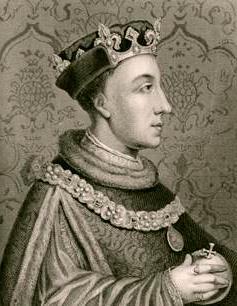Henry V
Thanks in part to Shakespeare's portrayal of him, Henry V is usually remembered as a heroic warrior-king, admired for his charismatic leadership, military and political genius, and extreme piety.
Henry's war with France was probably motivated more by the need to win support and prove his legitimacy than by a belief in his right to the French throne*.
But Henry's piety was genuine, zealous, and (as is often the case) to some extent hypocritical. The extent to which he was guided by humanity and compassion can be seen in his harsh suppression of the Lollards, and in his ability to be ruthless at need* during the campaigns in France. (The Lollards were early "protestants"; in 1417 Henry executed their leader Sir John Oldcastle (see the next page).
A brilliant success?
Henry's remarkable territorial gains in France resulted from his exploitation of a civil war in France, brought on by Charles VI's bouts of insanity, who sometimes imagined himself made of glass and was overcome with fear for his own fragility.
A visual celebration of Henry's conquest of Calais.
Henry's impressive victories at Harfleur and Agincourt raised him to heroic status in England, but the Treaty of Troyes (1420) was only achieved by a fortunate alliance with Philip of Burgundy. According to the treaty, Henry was married to Charles VI's daughter, became regent of France, and was named heir to the throne. (Listen to a victory song* from the battle of Agincourt.)
Even so, Armagnac nobles ignored the treaty, making a third expedition necessary--during which Henry became sick with dysentry and died, only 6 weeks before Charles' death would have made him king of France.
Most historians agree that Henry's goal of conquering France was far beyond English resources. Thus, although Henry's premature death at the height of his success assured personal glory, his short-sighted ambitions left his son's administration burdens heavy enough to make civil strife inevitable.
The cost of the war later bankrupted the Lancastrian government, and territories were permanently lost which had been held securely for over 400 years. Much was made of these losses by the Yorkist kings and Tudor historians.
Footnotes
-
A hypocritical claim
The claim set forth in Shakespeare's play states the matter clearly: the French kings held the throne by right of their descent in the female line; therefore the same rules of heredity should have entailed that the throne pass to Edward III through his mother.
Ironically, Henry acted upon a view of hereditary right with regard to France, which his own Lancastrian dynasty in England was clearly violating.
-
Flexible morality
Examples were his willingness to level towns such as Harfleur, should they not surrender to him, and his ruthless execution of prisoners at Agincourt.
Machiavelli later wrote an astute piece on the need for flexible morality in princes.
-
A song of triumph
"The Carol of the Victory of Agincourt (1415)" was written to celebrate Henry's remarkable victory. Like most such nationalistic songs, the words (sung in their original pronunciation) claim that God was on the side of the victors.
Deo gracias Anglia, redde pro victoria.
[Give thanks unto God, O England, for victory.]
Oure kynge went forth to Normandy
With grace and myght of chivalry
Ther God for hymn wrought mervlusly,
Wherfore Englonde may call and cry
Deo gracias. [God be praised.]
He sette a sege [siege] for sothe to say
To Harflu town with ryal [royal] array;
That town he wan and made a fray
That Fraunce shall rewe [rue] tyl domesday.
Deo gracias.
Almythy God he kepe owr kynge
His peple and his welwyllynge
And give hem grace without endyng.
Than we may calle and savely synge
Deo gracias.
